Art Punk Perfection: Deerhunter’s Bradford Cox Interviews Pylon!
 Editor’s Note From Eldredge ATL July Guest Editor Pylon vocalist Vanessa Briscoe Hay: I could recount the times and places that my path has crossed with that of Bradford Cox, but that wouldn’t tell you how dear he is to me and what a good friend he has been. Even though I may have only had the opportunity every now and then to hang out, he is well, words fail me sometimes. I first met him after Pylon performed our reunion show back in 2004 at Little Kings. That was a show which was supposed to be an unannounced practice of sorts and people drove in from all over, including Bradford. He had been introduced to some of our records as well as those of some other Athens, GA artists during his childhood. It turns out he was born in Athens, but his family moved on to Atlanta where he grew up.
Editor’s Note From Eldredge ATL July Guest Editor Pylon vocalist Vanessa Briscoe Hay: I could recount the times and places that my path has crossed with that of Bradford Cox, but that wouldn’t tell you how dear he is to me and what a good friend he has been. Even though I may have only had the opportunity every now and then to hang out, he is well, words fail me sometimes. I first met him after Pylon performed our reunion show back in 2004 at Little Kings. That was a show which was supposed to be an unannounced practice of sorts and people drove in from all over, including Bradford. He had been introduced to some of our records as well as those of some other Athens, GA artists during his childhood. It turns out he was born in Athens, but his family moved on to Atlanta where he grew up.
He became one of our biggest supporters. Pylon opened for Deerhunter in Atlanta on Halloween 2008, not too many months before our guitarist Randy Bewley died. Deerhunter covered our song “Cool,” which the DFA released as one side of a single. Bradford also helped record the last three songs for Supercluster so that we could finish our CD “Waves.” I couldn’t think of anyone else that I wanted to come in and finish what Randy had started, even though I know so many other great guitarists. Bradford and Randy’s sensibilities and approach to sound are very similar. It’s something that you can’t put your finger on, teach someone or copy and yet they don’t sound a thing alike.
Anyway, Bradford agreed to interview Michael Lachowski and I for this piece to help bring attention to our upcoming release on Chunklet, “Pylon Live.” This is actually the second time he has interviewed us. He also talked to us for his blog back in 2007. I was struck then and now by his openness and curiosity. It was a pleasure to have a dialogue with Michael Lachowski and Bradford Cox. I hope our paths cross again someday soon.
Interview by Bradford Cox with Pylon bassist Michael Lachowski and vocalist Vanessa Briscoe Hay
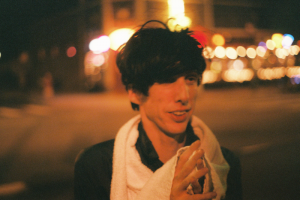 Q: What was the impetus to release a live album?
Q: What was the impetus to release a live album?
Michael: It was Henry Owings’ idea. I’d never managed to listen to a single live recording of a Pylon set all the way through, ever. I had no interest in those type of recordings because they were usually board tapes (unbalanced sound mix) and/or because I was there in the first place and didn’t want to go through it all over again in real time. But, I loved Pylon as a live band, on stage, with an audience — that was “the band” as far as I was concerned. So after hearing the idea from Henry, I thought that a live album might make sense after all — but only if a good recording of a good performance could be found, and if it was from Pylon #1 (rather than our later formations), and preferably from a “significant” show, or at least one I could recall having done.
Q: Since the live recording was from a multi-track recording was there any video? Who did the recording?
Vanessa: The recording was made during what was going to be our last show ever for the audio portion of a video, which was never released. This was going to be the pilot for something called the “Athens Shows” financed by Bob Gentile and John Fuller who are two local businessmen. Love Tractor were also videoed that night. Here is the information that was with the tapes. I personally do not know any of these people or even remember them! Recorded on December 1, 1983 at the Mad Hatter, Athens, Georgia by: Audio Production Manager: Hartley Schilling Audio Engineers: Scott Waterberry & Steve Mays Concert Sound: Chris Fulton & Brian Kay.
Q: Can you tell us any personal recollections or anecdotes about the show?
Michael: Ha! The best part of this release is that now my memories of that show have been helpfully reconstructed — by listening to the tracks a number of times, and seeing the single photo of us on stage that we were able to locate (taken from the crowd by Vanessa’s husband, Bob Hay). Given that it was the last time we thought we would ever be on stage and play those songs and be Pylon, it is amazing to me to hear how damn tight and pro the performance was.
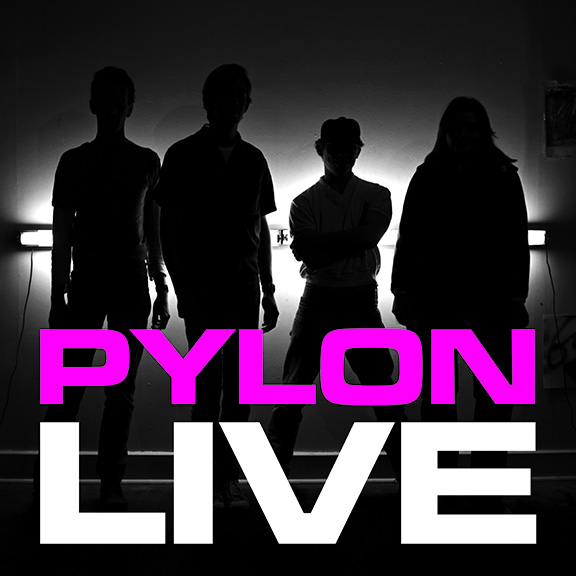
Vanessa: I remember bits and pieces of that night like Curtis constructing the set we used that day and the camera crew setting up. I had been mentally saying goodbye to the whole Pylon experience all through the recent goodbye tour we had just done. That night, I was able to just enjoy the show. I remember that Linda Hopper gave me a necklace and I broke it onstage and the beads scattered everywhere. During “M-Train” a bunch of friends came up and danced, including Jimmy Ellison who died around two months later from a brain tumor. We all had a champagne toast afterwards and all went our separate ways for a few years just living our lives.
Q: What do you make of the changing landscape of Athens?
Michael: I don’t know what to make of the changes in Athens except to acknowledge that economically viable places are always experiencing change — so Athens is obviously not a sleepy southern town anymore.
Q: Pylon, in my humble opinion, has always defined “art punk” perfectly. I always felt just as stimulated by your band in the realm of visual art and graphics and sculpture as well as musically. And to top it all off, there was a remarkable lack of pretense. Vanessa particularly has always struck me as such a personification of this “down-to-earth but beyond it” quality. Do you think there can be bands and personalities of this nature that can thrive in today’s radically different culture?
Michael: It was effortless for us since we always saw our band and the music it presented as an extension of what we had come to think of as art. We drew our confidence from that conviction since we didn’t have the skills to draw it from our musicianship. While that spirit existed in a number of other Athens bands, I’m not sure anyone else was as grounded there as Pylon, all four of us being art students. Our early shows made that connection more clear, and as we got better and more used to it all, we became more like a traditional band. But our DNA was already set and that’s even what brought about our 1983 ending.
Vanessa: Gosh, thanks! That is a huge compliment coming from you Bradford. I feel very lucky to have met the people that I met when I did. So many things were happening at a critical stage of our youth in art and music around the country and across the world. People were living and breathing art and all hanging out together. It’s a different scene and time now, but there are always new things happening. People are just coming from a different place — which they have to because it is a different time. Yet, it’s the same in some respects. There is something in the way that we are wired to be creative in the first place.
Q: Was it easier to develop a community of artists and become aware of the peculiarities of your town before the Internet flattened everything into a fragmented index? Athens is such a haunted place.
Michael: Oh yeah, like everywhere, it was easier before the internet — not just in Athens, even big city scenes like NYC. Then people depended on the known regularity and certainty of particular hot spots, you just knew to show up — and all of the connections happened in person, in real time, with live music.
Q: Did you guys ever consider yourselves “Southern Gothic?” I remember when I 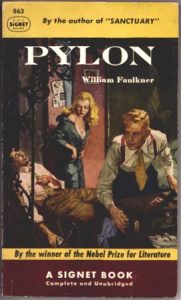 was growing up reading that you were named after a Faulkner novel. A lot of the lyrics seemed to me to be surreal fragments of a narrative that seems distinctly southern.
was growing up reading that you were named after a Faulkner novel. A lot of the lyrics seemed to me to be surreal fragments of a narrative that seems distinctly southern.
Michael: Ha, no, we never identified as Southern or Gothic. Like the rest of punk (we were on the tail end of that, of course), we were forward-looking and rejecting what came before — all the more so if it came from our small town and our southern region. We were influenced by bands from New York, England, Cleveland, Germany, and visual art, and films like “Eraserhead.” Early on, a critic asked, “How could a band from Athens, GA sound like they’re from Manchester?” Our name came from an industrial aesthetic found in the pylons (safety cones) at the factory where Curtis, Vanessa and I worked on weekends. We weren’t familiar with the Faulkner novel until later when people brought it up. Someone gave me a copy, but I’ve yet to read it.
Q: You should read it. It is one of his best in my opinion. It was later made into a not very good film called “Tarnished Angels.” My love for Faulkner actually started because of my misconception that that was where you got your name. Pylon was the first book of his I sought out. This was around middle school. Now I have a dog named Faulkner. All because of incorrect Pylon mythology.
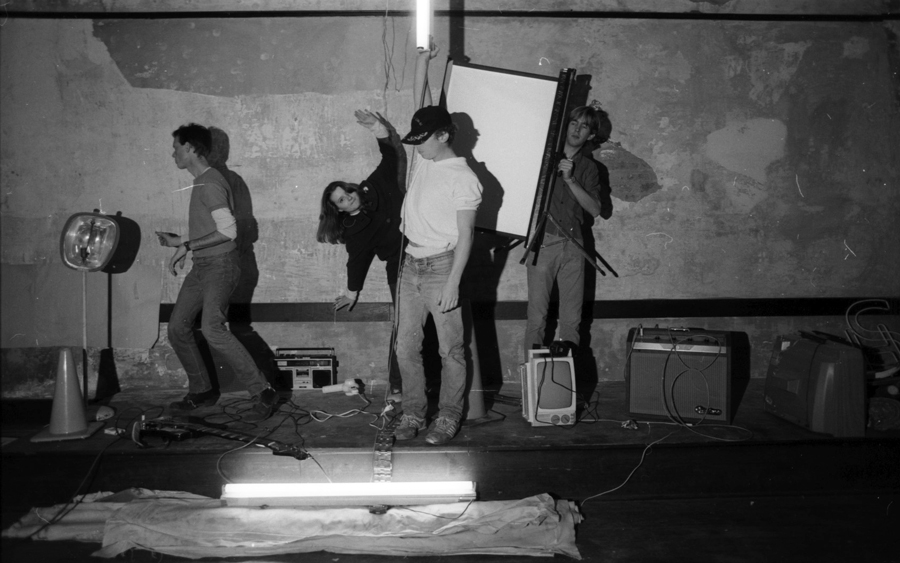
Vanessa: Somewhere along the line it was misconstrued that we were named after a Faulkner novel. The name actually came about from our interest in minimalism and industrial art and we were looking for a word that evoked an image or shape. We had a list of band names that we chose from. Diagonal was also on that list.
Q: Diagonal is a great name. Very Paul Klee or Constructivist sounding. I love the graphic sensibility you guys have always displayed.
Michael: I’m glad we didn’t end up being Diagonal, though. The concept was that we’d represent the name with any sort of diagonal line or shape instead of spelling out the name — kinda like “the band represented by a diagonal” long before “the artist formerly known as Prince” happened.
Q: Does the idea of “time and place” become a burden as culture shifts? I often find myself longing for a simpler time where bands in Athens and Atlanta played with more radical impulse and less ambition. There was a lot less conformity and formulaic patterns. Just freaks, really. Then I wonder if I’m imagining a past that never was.
Michael: Actually I think you’re describing a past that really was! I do think the scene Pylon was in might have had “more radical impulse and less ambition,” but I think the period of band ambition was in the middle period since then. Aren’t we out of that again? I mean, I know everyone is a lot more sophisticated (i.e., informed, aware, making very intentional moves), but that’s evenly across the culture, so within that there has to be the same relational hierarchy of radical impulse vs. ambition. That’s my hope, anyway — because I believe young people have to feel that.
Q: Michael your bass playing always was the Xacto knife underpinning Pylon’s stark minimalism. You later became involved in electronic music. Do you see Pylon as a precursor to your interest in movements of electronic music?
Michael: Oh gosh, what a compliment. Yes, I might have been the standard bearer of Pylon’s minimalism, but I’ve always allowed that that could have been as much a function of my limited ability as of a firm conviction to keep the bass lines that basic. Another factor was performance — after I got more dexterous on the instrument, my main interest was still in being free to move around a lot. I’d lock my hand on the bottom of my pick up and bounce and swirl while still making most of those minimal notes. And from the beginning I was equally informed by electronic music — Cabaret Voltaire, DAF, Kraftwerk — as the other stuff. The electronic, then beat box influence, found a direct expression in the studio-conceived song “Yo-Yo” on “Chomp.”
Q: Vanessa, listening to these live recordings and even as a kid listening to the albums, I always felt you were in a trance. This was hugely influential on me. Can you describe your experience when performing?
Vanessa: A few years ago, people started using the phrase “being in the zone.” I can understand that phrase, but I can’t tell you how to get there. I know that on a good night I feel one with the music, the audience and with the band. This might sound a little pretentious to someone who hasn’t gotten to experience it. I get the same feeling when looking at certain works of art or being in a beautiful place out in nature. I used to get to the same place when making art, which I haven’t done in awhile, but hope to again. We really are connected to everything, we just can’t always experience it.
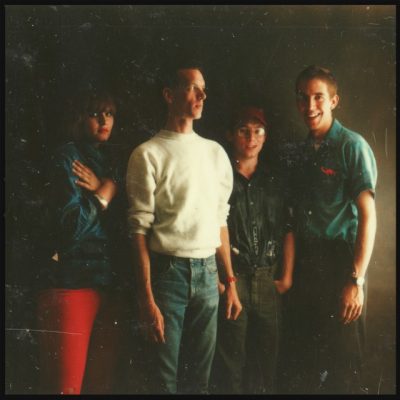
Q: If Pylon in 1983 had a smell, what would it be?
Michael: Cigarette smoke. Vanessa and I smoked a lot then, and Curtis and Randy put up with it.
Vanessa: Haha! For me, it would be those negative ions in the summertime right before the rain hits for a thunderstorm (Randy had a negative ion generator in the van) — or maybe breakfast — which we always had to eat.
Q: Do you remember light looking different in those days?
Michael: The sky at night looked different, and I was awake for it.
Vanessa: My windows were more likely to be open back then. I was more likely to be outside and aware of the seasons. There was less traffic. There was less light in the sky at night. My experience of light was different then from now, even if it wasn’t different.
Q: I’m told Randy was the archivist of the group. Can we expect more releases in the future?
Michael: I’m still hoping to realize a project Randy and I agreed upon — a collection of our photographs based around Pylon and the music scene of that time.
Headshot of Vanessa Briscoe Hay (above) taken by Christopher Sikich.

Richard L. Eldredge is the founder and editor in chief of Eldredge ATL. As a reporter for the Atlanta Journal-Constitution and Atlanta magazine, he has covered Atlanta since 1990.

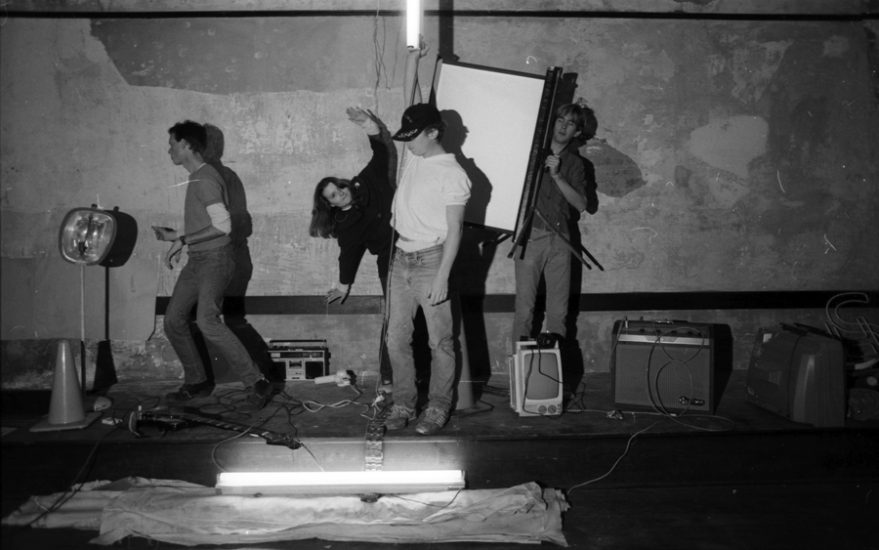



Art Punk Music - Music News Beat
June 15, 2017 @ 6:58 pm
[…] Basically, yes, some of the innovations and radical visual styles associated with punk (which, in turn, often borrowed from earlier art movements) did impact more widely on graphic design practice, if only as an inspiration for the next generation of designers. [9] I think one of the things we were trying to unpack in The Art of Punk was the graphic design aesthetic of punk and its function and relevance to wider design practice, or otherwise. [9] Now, within weeks of each other, two thick, illustrated volumes have appeared: Punk: An Aesthetic (Rizzoli) edited by Johan Kugelberg and Jon Savage, and The Art of Punk (Omnibus Press/Voyageur Press) by Russ Bestley and Alex Ogg. [9] Q: Pylon, in my humble opinion, has always defined "art punk" perfectly. [10] […]